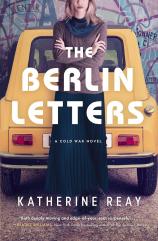The Berlin Letters: A Cold War Novel
Review
The Berlin Letters: A Cold War Novel
In this gripping novel set during the Cold War, Katherine Reay presents two narratives and two timelines as Luisa Voekler, a CIA code breaker, learns about a group of letters, referred to as the “Berlin letters.” When she's asked to help decode one, she realizes that it's similar to a letter she saw her grandfather, Walther, receive when she was a child. Luisa’s grandparents brought her and her aunt Alice from Berlin to the US after the Berlin Wall went up. They won't talk much about life in Germany, and Luisa knows that there are secrets they don't share with her.
We learn about the events in the story through the first-person narration of both Luisa and Haris, the father she thought had died with her mother, Monica, in a car accident when she was three. Luisa had lived in East Berlin with her parents. She and her mother are on their way to meet her maternal grandparents, who had moved to the American sector of Berlin, on the day the wall is being erected between East and West Berlin. On the spur of the moment, Monica hands Luisa to Walther over the barbed wire. She is stopped before she can make it over, so she is stuck in East Berlin with her husband, while their daughter is free in West Berlin.
"The writing is such that we are hooked from the start. We really like Luisa, and it's hard to put the book down because we feel invested in her story. We want to know what she finds out about the letters and her family."
To make Luisa's life easier after her grandparents move with her and Alice to America, Haris wants Walther to tell her that both her parents are dead. And until Luisa finds hidden letters from her father to her grandfather, written in code, she has no idea that he is still alive. Her much beloved grandfather died recently, and she has moved in with her grandmother. She realizes that there is much she doesn't know about her grandparents' lives in spite of their insistence on honesty her whole life. They have kept secrets that make it difficult to completely understand the hows and whys of some of their behaviors.
From a young age, Luisa's grandfather taught her to solve puzzles and decode ciphers. She's good at it, and while she wanted to be a CIA agent, she ended up being shuffled into different divisions doing desk jobs without being told why. That failure devastated her. We are really invested in the narrative from the start, and we want to find out what secrets Luisa will uncover, if she'll find her father, and if she'll learn the truth about her whole life.
What Reay does extremely well is to share the fear, the paranoia, of living in a communist country where spying on neighbors isn't just encouraged, it's forced. Residents don't know who is a friend and who is spying for the local police. While Haris began life as a young boy who appreciated how the new communist German (Russian) government cared for him, sent him to school and picked out his job, he has come to realize that their way of life is not a shining example of anything. Instead, it's depressing, with no hope of a better future. His job as a journalist consists of writing fluff pieces that are devoid of any real information and only serve to bolster the German government.
This novel has much to commend it. In addition to being a spy story and a commentary on historical events that might not be familiar to many of us, there's a soupçon of romance. The writing is such that we are hooked from the start. We really like Luisa, and it's hard to put the book down because we feel invested in her story. We want to know what she finds out about the letters and her family.
Also, the book is set in a time period that is often overlooked: post-war Germany during the life of the Berlin Wall. Reading it certainly opens our eyes to the stultifying life that those living behind the Iron Curtain faced. One of the many touching moments in the novel is when Haris marvels that Luisa was able to decide --- on her own --- that she wanted to attend college. She picked the school and her career. No government official forced her to do anything.
Reay depicts the dangers of an authoritarian government. Only those at the top, and their friends and relatives, garner the power, money and luxury. Everyone else is watched, spied on, threatened and forced to work at whatever they are told to do. The politicians and the KGB and its ilk have it all; the common man has nothing. It's a beautiful story with a perfect ending: the fall of the wall. But it also should serve as a cautionary tale.
Reviewed by Pamela Kramer on March 9, 2024
The Berlin Letters: A Cold War Novel
- Publication Date: March 5, 2024
- Genres: Fiction, Historical Fiction, Historical Thriller, Suspense, Thriller
- Paperback: 368 pages
- Publisher: Harper Muse
- ISBN-10: 1400243068
- ISBN-13: 9781400243068




